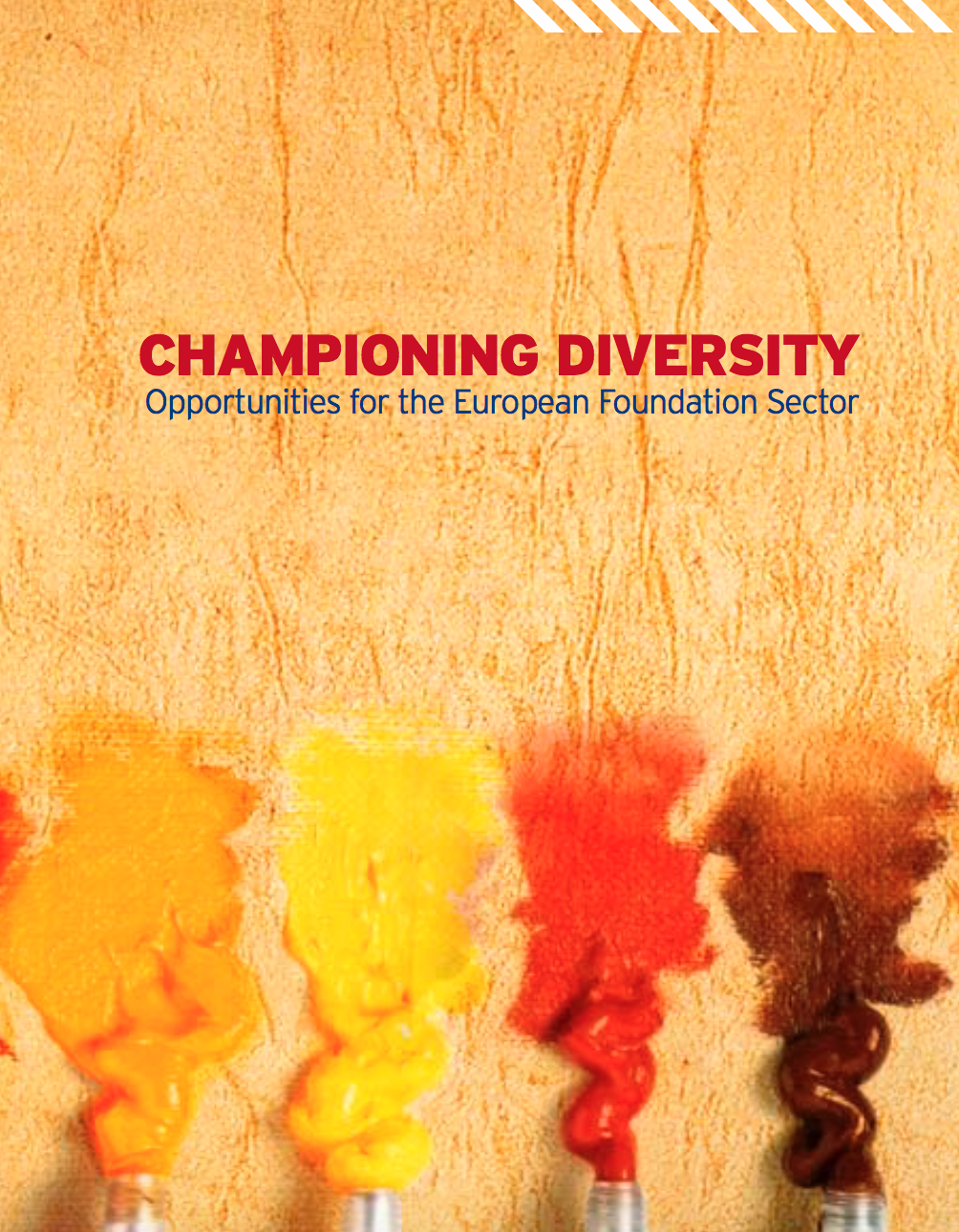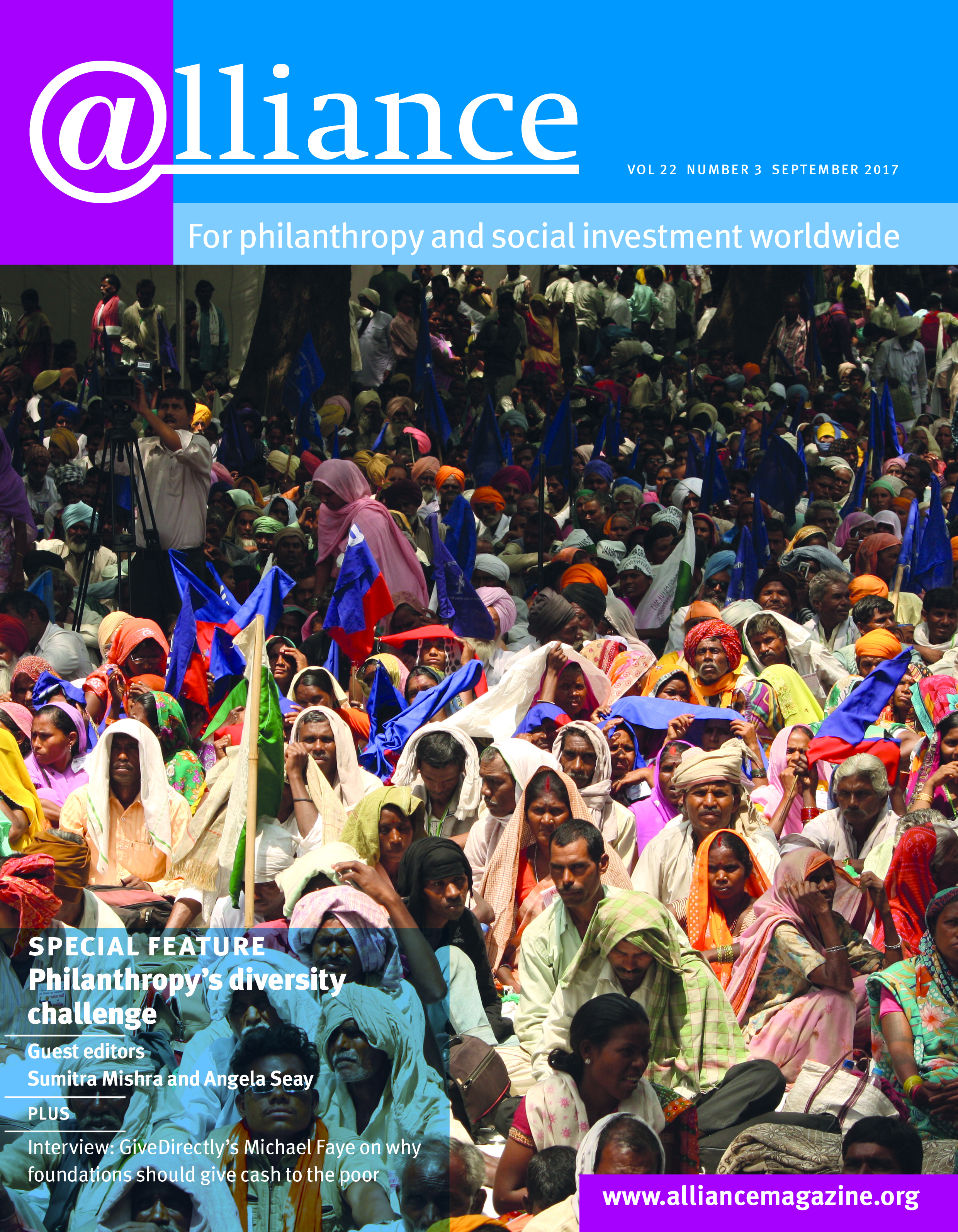Nearly a decade ago, a group of European foundations, loosely organized in a European Foundation Centre (EFC) interest group, set out to develop a collective plan to promote diversity and inclusiveness in the philanthropic sector. The premise was that people from ethnic minorities were under-represented, and that foundations would be significantly more effective if their compositions better reflected the broader populations they served. Their efforts resulted in the publication, Championing diversity: opportunities for the European foundation sector, which explored three key areas: foundations as funders, as employers, and as community leaders contributing to the public good.
Raising awareness about diversity is a long-term process, but the lack of change in the European philanthropic sector is palpable and disheartening.
 At the EFC’s 2015 conference, a session devoted to the issue attracted fewer than a dozen people. Although the conversation was animated, the sense that ‘nothing has changed’[1] dominated and persists to this day.
At the EFC’s 2015 conference, a session devoted to the issue attracted fewer than a dozen people. Although the conversation was animated, the sense that ‘nothing has changed’[1] dominated and persists to this day.
Ali Khan, thematic networks manager at the EFC, commented in a recent interview: ‘There is a growing group of people calling for change, who are noticing that not much has shifted. People seem to hope that this will just change by itself. They are not moving to put change into practice.’
Comparisons with the corporate world indicate that philanthropy is way behind the curve on this issue.
‘Corporate foundations could play a leading role in transforming the sector as they are more innovative with regards to diversity.’
Sara Llewellin, chief executive of the UK’s Barrow Cadbury Trust, notes: ‘We made changes for moral reasons while the for-profit sector did so to make a profit – and they have been more motivated. Diversity in the social sector in terms of ethnic minority representation is still a serious issue, not only in philanthropy.’
Noting a similar trend, Rien van Gendt, chair of an umbrella organization for philanthropy in the Netherlands, suggests that ‘corporate foundations could play a leading role in transforming the sector as they are more innovative with regards to diversity’.
The lack of progress also contrasts with the broader context of anti-discrimination law in Europe.
‘Sixteen years after the adoption of the Racial Equality and Employment Equality Directives, their transposition has immensely enhanced legal protection against discrimination on the grounds of racial or ethnic origin, religion or belief, age, disability and sexual orientation across Europe,’ says Isabelle Chopin, director of the Migration Policy Group.
Nevertheless, indirect discrimination remains an issue, even within foundations attempting to tackle these questions.
Foundations as funders
A 2017 report[2] by Ariadne, a European human rights funder network, demonstrates the philanthropic community’s awareness of the need for greater cultural understanding, inclusion and equity.
 It highlights that many foundations are actively involved in diversity and inclusion issues.
It highlights that many foundations are actively involved in diversity and inclusion issues.
My recent interviews confirm this. At the German Freudenberg Foundation, for example, director Pia Gerber points out: ‘We have continued to prioritize migrant voices being listened to and aim to have them included at every stage of the foundation’s work.’
One innovative approach that Freudenberg has participated in is the creation of a Roma and Sinti-led foundation, Hildegard Lagrenne Stiftung. The King Baudouin Foundation in Belgium is also engaged.
Françoise Pissart, its director and poverty and social justice, notes: ‘Our foundation does not have taboos concerning the question of integration. We are a multicultural society in Belgium and the foundation aims to reflect that. This is a lofty ambition, yet it is what we strive for.
‘It is difficult to attain for many reasons – we still live in a society that is marked by segregation. Yet the population is calling for better integration, which is increasingly understood to be a two-way process,’ she says.
Foundations as employers with good governance procedures
However, foundations are struggling to apply this broadly positive external approach to their own operations – with potentially serious consequences. The lack of diversity on boards and at staff level ‘probably limits their intelligence about what is happening on the ground – the foundation world should reflect the streets more’, suggests Gerry Salole, EFC CEO.
The challenge is laid out clearly by European Cultural Foundation board member Nike Jonah: ‘We need to ask ourselves: is there a will for change? I want us to be ahead of the curve and lead by example. We need to look at new ways to share power. People need to be able to ask themselves: where is my privilege and how do I share it? We have to do more and go wider to try to bring in people from a whole host of marginalized communities.’
Foundations are struggling to apply this broadly positive external approach to their own operations – with potentially serious consequences.
Foundations as community leaders contributing to the public good
The inability of foundations to align their programme commitments to diversity and internal change undermines legitimacy.
‘We could propose to introduce voluntary reporting standards on diversity policies, even if it is not required by the tax authorities. If you want to be transparent to the outside public then one of the areas to focus on is your diversity policy because it is a proxy for your effectiveness,’ says van Gendt.
In the challenging international context, anything that can be done to bolster credibility in the sector should be a priority. Brexit, Trump, and the unpredictable results in the recent French elections indicate that elites have been out of touch with the pulse of what is going on in the streets. Foundations could play a bigger role as an intermediary between various communities.
Moving forward…
‘We need research – both quantitative and qualitative data – to better understand what is going on at staff and board level to be able to undertake solid analysis and monitor the situation. How deep is the problem? How difficult is it to make adjustments? We need to accept that this initial data set will likely be quite negative,’ remarks Ali Khan.
Diversity is a broad-tent concept, and we should be careful about how it is defined. While ‘it does not necessarily mean racial advancement and it is not a proxy for racial justice, it can mean a broader range of perspectives being brought to the table’, according to Sara Llewellin.
Regardless of how you define the term, there is a consensus that diversity is lacking in the European philanthropic sector. But without collecting baseline data to measure progress, or increasing transparency, it is very hard to imagine any real advances will be made. Let’s not wait for the next update of this publication in eight more years to move the agenda forward.
Karen Weisblatt is founder and CEO, Weisblatt & Associates, Strategic Philanthropy Advising. Email karen@weisblatt-associates.com
| European philanthropy and diversity |
|---|
| 2006: The European Foundation Centre’s Diversity, Migration and Integration Interest Group was created.
2009: ‘Publication of Championing diversity: opportunities for the European foundation sector’, edited by Karen Weisblatt. The report notes that ‘…conversations on the future of integration and immigration continue to challenge European societies.’It also mentioned a concern that hiring quotas ‘might eventually be part and parcel of the European legal landscape’ and could become a powerful motivating factor for foundations. 2015: A ‘Diversity matters’ session, organized by the EFC at its annual conference in Milan six years after ‘Championing diversity’ finds that, ‘the sector continues to be void of representation of the diverse communities it serves on a daily basis’. 2016: Email to European Funders Network Ariadne UK members notes ‘a very real concern’among members at ‘the lack of diversity on the boards and the senior management of UK grant-making trusts and foundations’. 2017: The UK social investment field creates a cross-sector working group and calls on organizations in the sector to identify a ‘diversity champion’. 2018: EFC to convene a peer-exchange on diversity policy and practice.measurement. |






Comments (1)
The link to the EFC publication of 2009 does not seem to work. I found it here: http://efc.issuelab.org/resource/championing-diversity-opportunities-for-the-european-foundation-sector.html